Citizenship Amendment Act: India top court to hear petitions in January
- Published
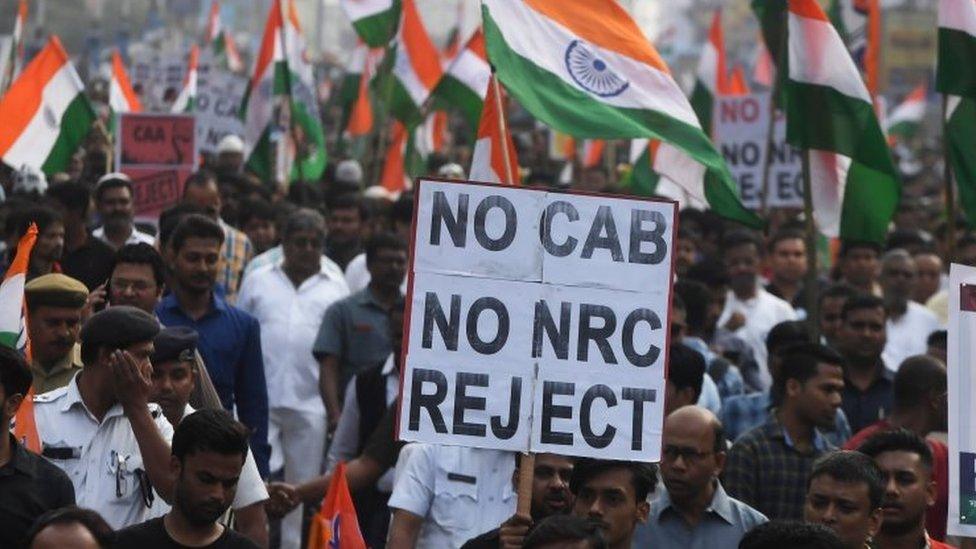
Anger against a new citizenship law is growing
India's Supreme Court has said it will take up a clutch of petitions against a new citizenship law next month, as anger against it grows.
The court told the federal government to prepare a response to the petitions, but the law has not been stayed.
The decision comes even as Prime Minister Narendra Modi reacted with defiance to widespread protests against the Citizenship Amendment Act (CAA).
The law offers citizenship to non-Muslims from three nearby countries.
The Hindu nationalist Bharatiya Janata Party (BJP) government says it will protect people from persecution, but critics say it's part of a "Hindu nationalist" agenda to marginalise India's more than 200 million Muslims.
Adding to the fears is a government announcement that it plans to carry out a widespread exercise to weed out "infiltrators" from neighbouring countries.
Given that the exercise relies on extensive documentation to prove that their ancestors lived in India, many Muslim citizens fear that they could be made stateless.
However, Mr Modi said the law "will have no effect on citizens of India, including Hindus, Muslims, Sikhs, Jains, Christians and Buddhists".
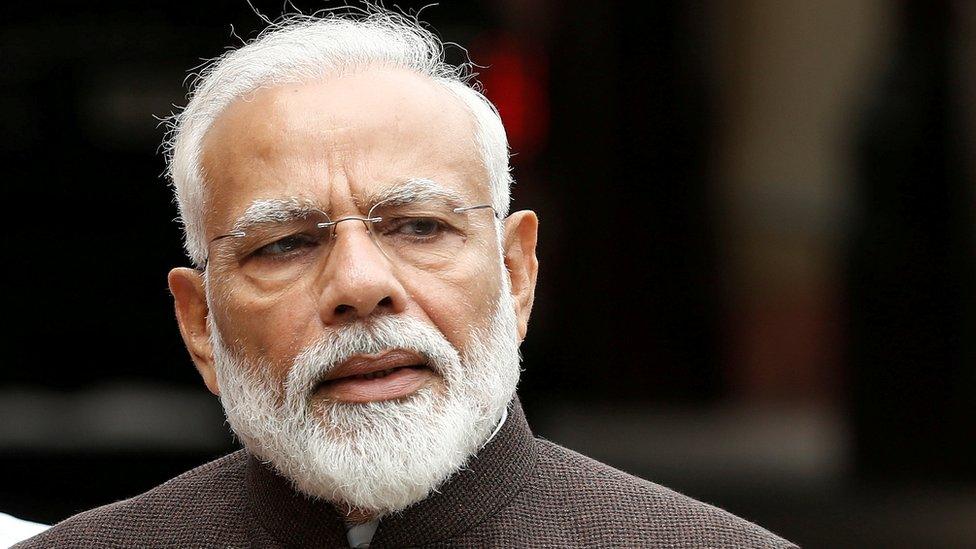
Narendra Modi blamed political rivals for the unrest
The prime minister also told his supporters at a rally on Tuesday that the opposition was "spreading lies and rumours", "instigating violence" and "used its full force to create an atmosphere of illusion and falsehood".
Home Minister Amit Shah echoed the sentiment to media saying "both my government and I are firm like a rock that we will not budge or go back on the citizenship protests".
Who is protesting and why?
There have been demonstrations in cities across India.
Opponents say the law is exclusionary and violates the secular principles enshrined in the constitution. They say faith should not be made a condition of citizenship.
Others though - particularly in border states - fear being "overrun" by new arrivals from Afghanistan, Bangladesh and Pakistan.
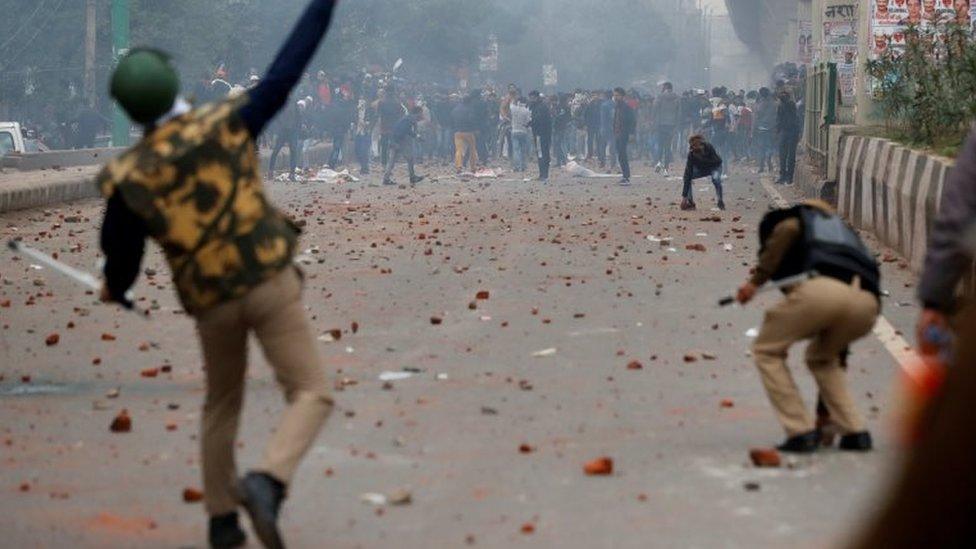
Police threw bricks back at demonstrators during protests in Seelampur in Delhi
Many of the student demonstrations focus less on the law itself but more on the alleged police brutality against protesters.
The capital Delhi has seen mass protests over the past days after a student demonstration on Sunday turned violent and left dozens injured.
How violent are the protests?
On Tuesday, images from the city's Seelampur area, which has a large Muslim population, showed stone-throwing crowds confronting police officers. Police retaliated with tear gas and batons.
Meanwhile, the Supreme Court refused to hear a petition against the police action inside Delhi's Jamia Millia Islamia University, where on Sunday they allegedly attacked students inside campus premises.
A man injured during the protests on that day told the BBC a policeman had shot him with a pistol or revolver.
Authorities deny police used live ammunition and have suggested the wounds might be from shrapnel from tear gas canisters.
Mohammed Tameen says police shot him at close range
Earlier this week, Mr Modi had attempted to calm tensions in a series of tweets saying "this is the time to maintain peace, unity and brotherhood".
What is the law about?
The act offers amnesty to non-Muslim illegal immigrants from three countries - Pakistan, Bangladesh and Afghanistan.
It amends India's 64-year-old citizenship law, which currently prohibits illegal migrants from becoming Indian citizens.
It also expedites the path to Indian citizenship for members of six religious minority communities - Hindu, Sikh, Buddhist, Jain, Parsi and Christian - if they can prove that they are from Muslim-majority Pakistan, Afghanistan or Bangladesh. They will now only have to live or work in India for six years - instead of 11 years - before becoming eligible to apply for citizenship.
The government, says this will give sanctuary to people fleeing religious persecution.
Critics say its actual agenda is to marginalise India's Muslim minority.
The fears are compounded by the government's plan to "weed out infiltrators". Home Minister Amit Shah proposed a nationwide register of citizens to ensure that "each and every infiltrator is identified and expelled from India" by 2024.
The National Citizen's Register (NRC) has already been carried out in the north-eastern state of Assam and saw 1.9 million people effectively made stateless.
In the run-up to its publication, the BJP had supported the NRC, but changed tack days before the final list was published, saying it was ridden with errors.
The reason was that a lot of Bengali Hindus - a strong voter base for the BJP - were also left out of the list, and would possibly become illegal immigrants, correspondents say.
However, the NRC and the Citizenship Amendment Act are closely linked as the latter will help protect non-Muslims who are excluded from the register and face the threat of deportation or internment.
- Published18 December 2019
- Published12 March 2024
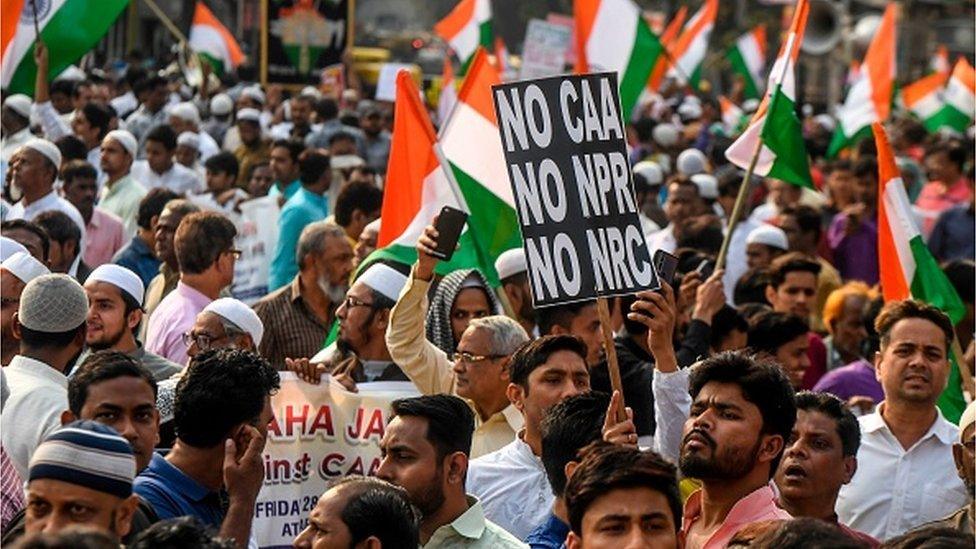
- Published16 December 2019
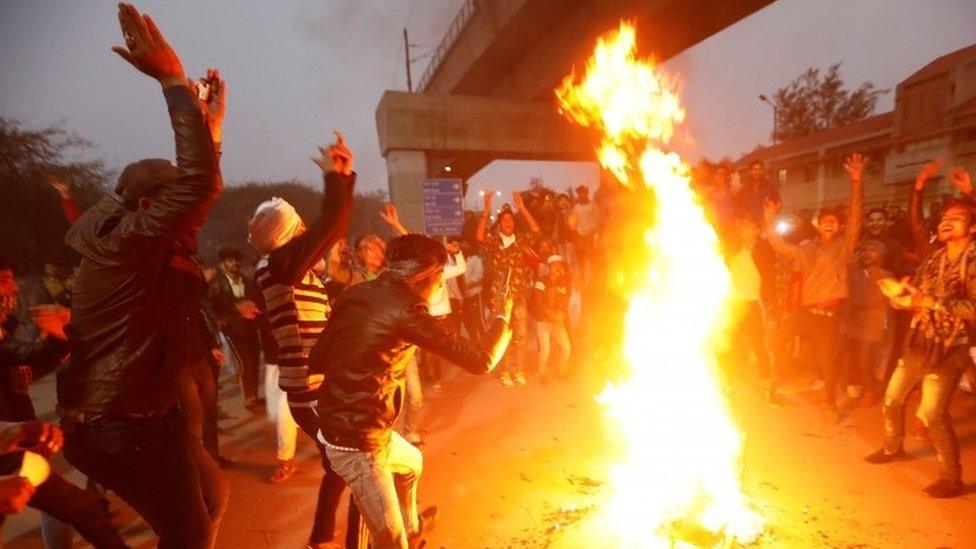
- Published13 December 2019